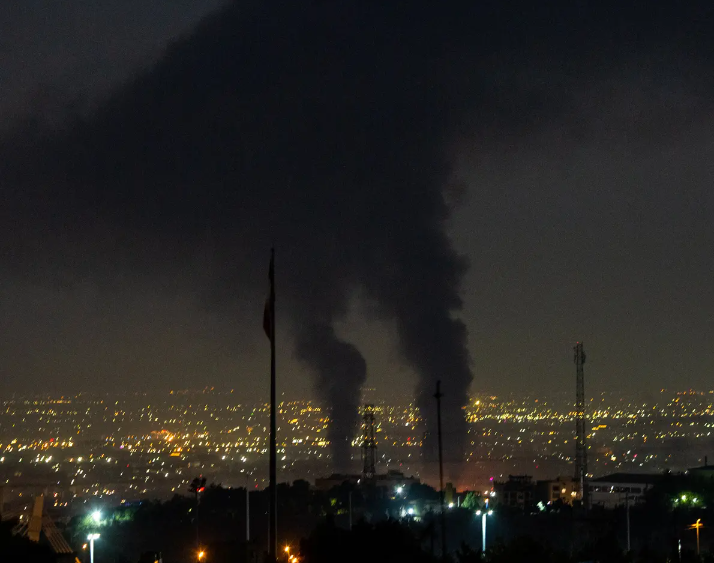
“Tehran No Longer Immune”: Israel and Iran Exchange Devastating Blows in Second Day of Aerial Warfare

A storm of firepower engulfed the Middle East as Israel and Iran plunged deeper into open conflict, with the Israeli military carrying out a second consecutive day of high-stakes airstrikes that penetrated deep into Iran’s capital, Tehran. The conflict, now escalating at an alarming pace, has claimed dozens of lives and intensified fears of a broader regional war.
In the early hours of Saturday, Israeli fighter jets lit up the skies above Tehran with a barrage of targeted airstrikes aimed at crippling Iran’s air defenses and military infrastructure. Among the most significant targets was Mehrabad International Airport — a key aviation hub used for both civilian travel and military operations. According to Iranian state news agency IRNA, the assault struck a hangar used for housing military jets, triggering massive plumes of black smoke that could be seen across the city.
Eyewitness footage, verified by The New York Times, showed thick smoke billowing from the western section of the airport, where military facilities are concentrated. As dawn broke, the scars of destruction were visible across parts of the capital, as emergency services scrambled to contain fires and treat the wounded.
Israel’s military confirmed it had launched dozens of warplanes in the operation and described the action as part of a larger campaign to “neutralize” Tehran’s aerial defense network. The air force also deployed drones in the strike, some of which are reportedly stationed permanently within Iranian territory. Brigadier General Effie Defrin, the Israeli military’s chief spokesman, made a chilling declaration during a press briefing: “Tehran is no longer immune. This is the deepest we have ever operated in Iran.”
The unprecedented air incursion followed Israel’s surprise predawn assault on Friday that targeted Iran’s nuclear and military installations, including sites allegedly involved in enriching uranium. The initial blitz stunned Iranian officials and sparked an immediate retaliatory response. Iranian forces launched multiple waves of ballistic missiles and drones at Israel, many of which were intercepted by Israel’s Iron Dome and David’s Sling defense systems. However, not all were stopped.
One Iranian missile struck a residential neighborhood in Rishon LeZion, just south of Tel Aviv. The missile flattened homes, killed two people — including 73-year-old Yisrael Aloni — and wounded at least 19 others. Emergency crews pulled survivors from the rubble as terrified residents flooded social media with videos of chaos and destruction. The identity of the second person killed, a woman, has not been released.
The ongoing exchange has already become one of the most intense military escalations between the two regional powers in modern history. Israeli military officials estimate they have carried out at least 150 strikes across Iranian territory since Friday, while Iranian forces have retaliated with over 200 ballistic missiles in addition to drone swarms aimed at key Israeli cities and military facilities.
Casualties on the Iranian side are mounting rapidly. Iran's government reported on Friday that at least 78 people had been killed and more than 300 wounded in Israeli attacks. That number is expected to rise significantly as recovery efforts continue. Among the dead, Israel claims to have eliminated four top Iranian military commanders and nine senior scientists linked to the country’s controversial nuclear program. Although Iran has not publicly confirmed the identities of those killed, the strikes have sparked outrage and mourning in several Iranian provinces.
The international community has responded with growing concern, calling for immediate de-escalation. But both sides appear poised for a prolonged confrontation. Iran’s leadership, still reeling from the sheer scale and precision of Israel’s deep strike into its capital, has vowed to respond “with unmatched force.” Meanwhile, Israeli officials are framing the operation as a defensive measure — a necessary step to prevent a nuclear-armed adversary from threatening its existence.
The roots of this conflict are tangled in decades of mutual hostility, espionage, assassinations, and proxy wars. However, the current escalation marks a dangerous new phase — one in which both nations are openly using military might to strike within each other’s sovereign territory. The symbolism of Israeli warplanes flying over Tehran, a city previously regarded as beyond Israel’s operational reach, is not lost on analysts.
“Israel is demonstrating it can reach the heart of Iran at will,” said security analyst Eyal Zisser. “It’s not just about deterrence anymore. It’s about reasserting dominance and destroying the infrastructure that threatens Israeli lives.”
Back in Iran, the mood is a volatile mix of anger, grief, and defiance. State-run media broadcast images of flattened buildings and funerals for those killed in Friday’s strikes. Calls for revenge echo from hardline clerics and Revolutionary Guard commanders. In Tehran, thousands gathered in city squares chanting slogans against Israel and vowing retaliation. “This blood will not be forgotten,” one protester shouted into a camera during a live broadcast.
Israel, too, is on high alert. Citizens have been urged to stay close to bomb shelters. Sirens have wailed throughout the day in major cities as incoming projectiles were detected. Schools have closed, flights have been canceled, and the military has called up reservists in anticipation of further Iranian retaliation.
Despite the destruction and the rising death toll, there appears to be little political appetite in either capital for backing down. While the United Nations Security Council has called for an emergency session, the situation on the ground suggests that diplomacy may be outpaced by missiles for the foreseeable future.
In the words of General Defrin, “We are prepared for the days ahead. Israel will do whatever it takes to protect its people and its future.” But with both nations now deeply entrenched in open hostilities, and with civilian casualties mounting by the hour, the world watches anxiously, hoping this war between ancient adversaries does not spiral into a regional cataclysm.


